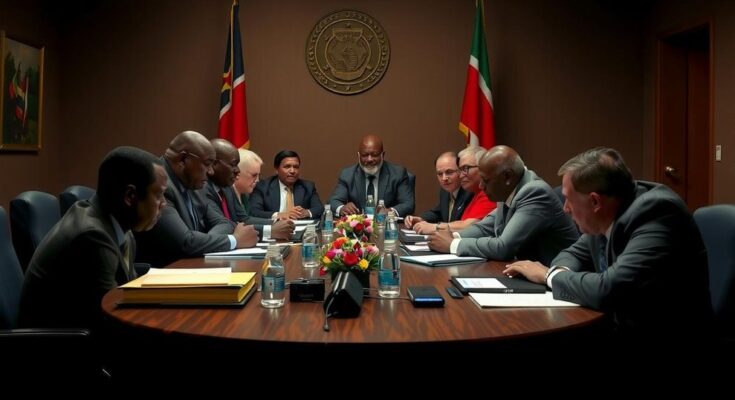Russia’s veto of a UN Security Council resolution for a ceasefire in Sudan has drawn fierce criticism from the UK and US, exacerbating tensions regarding international intervention in the ongoing humanitarian crisis stemming from a 19-month civil war between the Sudanese army and RSF. Activists have condemned the UN’s slow response, and calls for greater accountability in addressing the crisis have intensified.
The UN Security Council was marred by tensions following Russia’s veto of a UK-supported resolution which sought to impose a ceasefire in Sudan. This decision received widespread condemnation from the UK and the US. British Foreign Secretary David Lammy labeled the veto a “disgrace,” while Russia countered by accusing the UK of intruding into Sudan’s domestic affairs. Amidst a civil war lasting 19 months that has resulted in tens of thousands of fatalities and over 11 million displacements, aid workers have described the situation as a humanitarian catastrophe, with many on the brink of famine.
Moreover, the conflict erupted in April last year, rooted in a power struggle between Sudan’s army and the paramilitary Rapid Support Forces (RSF). The draft resolution, co-sponsored by the UK and Sierra Leone, called for a halt to hostilities and the initiation of dialogue between conflicting parties. Despite support from other Security Council members, the veto by Russia prevented its passage.
In response to the veto, Secretary Lammy articulated his concerns, questioning how many more lives would be lost without intervention. The US Ambassador to the UN, Linda Thomas-Greenfield, further criticized Russia for undermining efforts to resolve the dire situation, accusing it of manipulating the conflict for its political gains. In defense, Russia’s UN representative Dmitry Polyanskiy asserted that the resolution disregarded Sudanese sovereignty and termed the UK’s actions as provocative.
Sudan’s ambassador, Al-Harith Idriss al-Harith Mohamed, expressed frustration that certain desired conditions were absent from the resolution, including a condemnation of the UAE’s alleged support of the RSF. Both the army and the RSF have faced scrutiny over human rights violations and possible war crimes. Meanwhile, activists have voiced discontent over the UN’s slow response to the ongoing crisis.
The ongoing conflict in Sudan has plunged the nation into a severe humanitarian crisis. Following escalating tensions between the Sudanese army and the RSF, a paramilitary faction, the situation has devolved into a civil war with widespread destruction and humanitarian fallout. International responses have been varied, with significant criticism directed at the UN for perceived inaction and delayed responses in supporting peace efforts. Moreover, Russian influence in global policy decisions has been increasingly scrutinized, particularly in cases like Sudan where geopolitical interests may overshadow humanitarian concerns.
In summary, the recent veto by Russia of a UN resolution aimed at establishing a ceasefire in Sudan has ignited significant outrage from Western powers, highlighting divisions within the Security Council on international intervention in conflicts. The humanitarian crisis continues to worsen, with mounting casualties and displacements among the Sudanese populace. This episode not only underscores the complexities of international diplomacy in conflict zones but also raises critical questions about the accountability of global actors in the face of human suffering.
Original Source: www.bbc.co.uk




